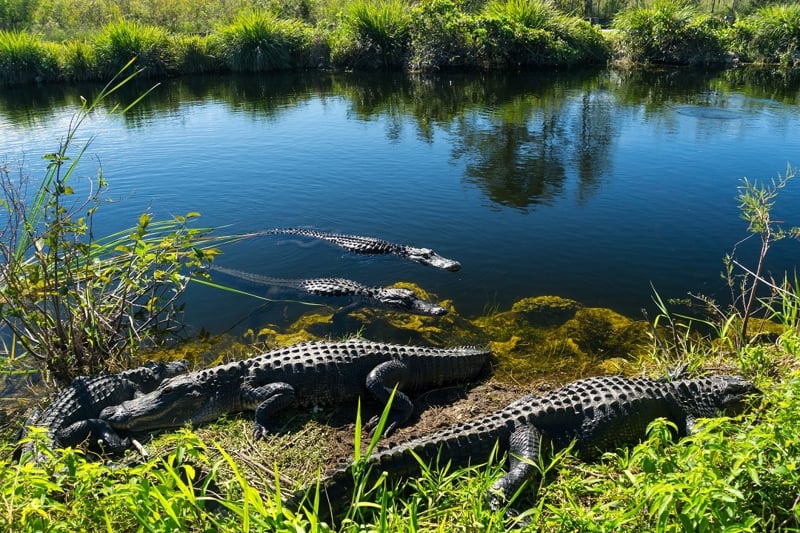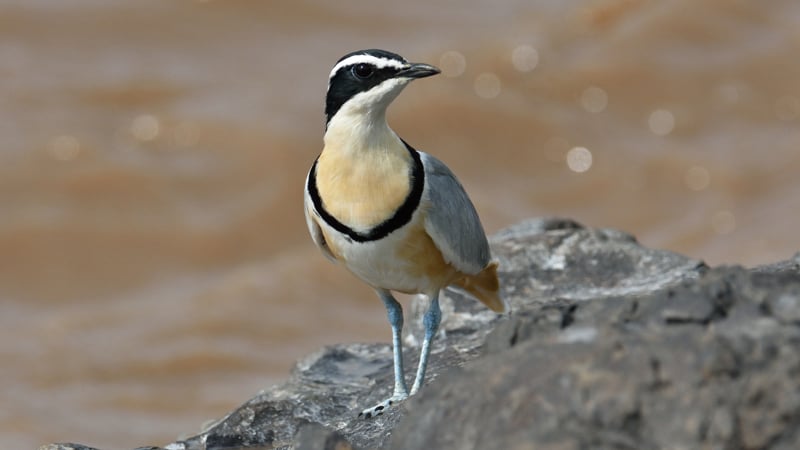
What you should know about crocodiles
Blog
Crocodiles, who have been on our planet for around 240-million years, are the closest living relatives of dinosaurs! While these magnificent creatures are often feared due to their strong jaws and the appearance of a menacing smile, crocodiles are both fascinating and ecologically important animals. Learn more about these scaly predators!
Here are some of the most interesting facts about crocodiles that may just make you appreciate these reptiles a little more!
Crocodiles play an important role in our ecosystems
Referred to as “guardians of freshwater ecosystems”, crocodiles play a vital role in maintaining a well-balanced, healthy and functioning ecosystem.
- As apex predators, they prevent other animals from overcrowding and damaging ecosystems.
- They play an important role in controlling agricultural pests and invasive species.
- Thanks to their ferocious appetite, they eat every part of their prey, preventing leftover flesh from decaying and spreading any harmful bacteria in the surrounding environment.
- Their droppings serve as nutritious fish food (yum!).
Ecologists even argue that the extinction of crocodiles could have devastating consequences on ecological processes and damage ecosystems drastically.
Crocodile species range from massive to tiny
There are 13 different crocodile (Crocodylus) species, ranging wildly in size.
The largest of them all is the saltwater crocodile, the earth’s largest living reptile. Males can reach more than 7 meters long and weigh up to 1,000 kg (about 2,200 lbs)! Their extremely powerful jaws, with very long teeth, give them the strongest bite in the animal world!
An Australian Saltwater Crocodile (Photo: Zoe Ezzy / Shutterstock).
On the opposite spectrum is the world’s smallest crocodile, the dwarf crocodile. This species can be found in the rainforests and mangrove swamps of West and Central Africa. The dwarf crocodile rarely grows to more than 2 meters long and only weighs around 18–32 kg (approximately 40-70 lbs).
 A dwarf crocodile (Photo: Svoboda Pavel / Shutterstock).
A dwarf crocodile (Photo: Svoboda Pavel / Shutterstock).
Crocodiles are gentle and caring mothers
Despite their reputations for being powerful and fierce, crocodiles have a surprising softer side – they are gentle and caring mothers.
Depending on the species, female crocodiles can lay from 10–100 eggs! Sometimes they bury them in riverside nests or lay them on the sand. Crocodile mothers stay close to their eggs to protect them from predators. When they are ready to hatch, the baby crocodiles croak and the waiting mother digs them up and carries them to the water gently in her mouth.
 A Nile crocodile mother carrying a newly hatched baby to the water (Photo: Catchlight Lens / Shutterstock).
A Nile crocodile mother carrying a newly hatched baby to the water (Photo: Catchlight Lens / Shutterstock).
It’s amazing how an animal with the most powerful bite in the animal world can also be so gentle.
Mother and baby crocodiles even ‘talk’ to each other. Baby crocs can make a sound that sends their mother running to them, and mother crocodiles will give a certain call when she wants the babies to come to her.
Crocodiles are apex predators
Crocodiles are the top predators in their environment. They are carnivores and feed on a range of live and dead mammals, birds, fish, crustaceans, amphibians, reptiles and more. They are not picky, and make sure to eat the whole animal, bones and all.
They are well known for their “ambush” style hunting strategy. They’ll wait for their prey to come close and then rush out to attack. This strategy works well as they are incredible fast swimmers in short bursts and can hold their breath underwater for around an hour!
 An Eqyptian Plover, also known as the ‘crocodile’ bird (Photo: Clayton Burne / Shutterstock).
An Eqyptian Plover, also known as the ‘crocodile’ bird (Photo: Clayton Burne / Shutterstock).
Did you know: crocodiles need dental care too! Nile crocodiles are known to have a symbiotic relationship with birds. The Egyptian plover (also cleverly known as the ‘crocodile bird’), sits in the mouths of Nile crocodiles and feeds on the food leftovers within. The crocodiles obviously see this as free dental care as they don’t eat the plover!
Another impressive feature of a crocodile is that when they lose a tooth, they simply grow another one to replace it!
 A Saltwater Crocodile (Photo: Lauren Suryanata / Shutterstock).
A Saltwater Crocodile (Photo: Lauren Suryanata / Shutterstock).
What’s the difference between crocodiles and alligators?
Crocodiles and alligators look very similar and are often mistaken for one another, but there are some key differences between the two, including:
- Snout shape: Crocodile snouts are typically narrower, more V-shaped and pointed, while alligator snouts are usually rounded and shaped in a U.
- Feet: Crocodiles have separated toes while alligators have webbed feet.
- Teeth: Due to an alligator's overbite, when their mouth is closed you often won’t be able to see any teeth at all. When you can see an alligator's teeth, you will only see their upper teeth, while crocodiles also have a large lower tooth that is visible when their mouth is closed.
- Location: Alligators are only found in parts of the United States and in eastern China. Crocodiles are more widespread and live in Africa, Australia, Asia, North America, South America, and Central America. Additionally, crocodiles prefer brackish water, while alligators primarily live in freshwater.

Moving the world for crocodiles
Of the 24 species of crocodile, 7 of them are listed as ‘Critically Endangered’ and 4 as ‘Vulnerable’. These animals are poached from the wild and intensively farmed and sold into the wildlife trade mostly for their skins and meat.
Every year, more than 1.6 trillion wild animals are killed and suffer because of profit and greed for their use as products or entertainments. But with your help, we will stop the cruelty that the commercial wildlife trade inflicts on animals.
We are calling on the Government of Canada to support the immediate and permanent closure of wildlife markets and end the commercial import and domestic trade in wild animals and wild animal products.
Sign the petition now to show your support for an end to the global commercial wildlife trade forever.